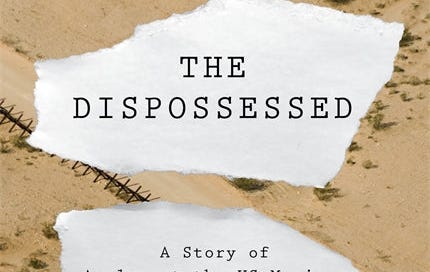When I think of Trump possibly back in office I think of Meybelín.
Meybelín was the six-year-old Salvadoran girl I spent a lot of time with and profiled, along with her father, in my first book, The Dispossessed. The book was about asylum, its ancient history, its international codification after World War II, and the current politics slowly dismantling it. It was also about family separation.
In 2018, Meybelín and her father, Arnovis, crossed the US-Mexico border in Texas and submitted themselves to border patrol agents to seek asylum.
After a couple of grueling days in a border patrol holding facility, agents told Arnovis that there wasn’t enough room on a transfer bus, which would transport them to another facility, and so he and Meybelín would have to split up. The agents told him Meybelín would go first and he would board the next bus. They were lying. There was no next bus.
A couple days later, after Arnovis’s insistent questioning and increasingly desperate demands to be taken to his daughter, he was transferred to an ICE detention center. When he asked about Meybelín, the officer didn’t know who who he was talking about.
My daughter, Arnovis replied. The agent said he didn’t know he had a daughter.
Another guard later told him Meybelín was either in Florida or New York.
For weeks he had no other information about her, no communication. Deportation officers were pressuring him to retract his asylum claim and sign papers so they could ship him back to El Salvador.
Meybelín turned out not to be in Florida or New York, but in Phoenix. She was in one of the detention centers where, it was later revealed, guards sexually and physically abused children.
After a month apart, Arnovis was convinced he’d have a better shot at being reunited with her if he gave up his asylum claim and accepted a deportation. Through the vigorous efforts of a group of attorneys, they found Meybelín and eventually had her returned to El Salvador as well.
Shortly after their painful odyssey, I visited the small coastal village where they lived and spent a lot of time talking to Arnovis, nailing down the details, interviewing family members, neighbors, local politicians, even retracing their journey out of El Salvador, through Guatemala and into Mexico. Meybelín was usually around, too, often clinging to her father. I grew close to her, played soccer with her, taught her tic-tac-toe, admired her drawings and goofed around with her and the passel of young cousins, friends, and puppies that often bounded around the family’s small property.
But despite succumbing to childish chatter and horseplay with her cousins, the experience of a desperate attempt at migration, a month of separation and isolation, and the very real fear her dad still faced from marauding gangmembers, all deeply impacted Meybelín. She never saw a therapist or got counseling — there was none available — and in the initial weeks after her deportation, the family thought it best not to talk about it. And then a month had gone by, and then two, and I left and then came back again, asking so many questions about Arnovis’s experience and memories of the journey. After a while, Arnovis and Meybelín’s grandmother both suggested I should talk to her.
I was conflicted. Though I had a lot of experience talking to people who had gone through trauma, I was no therapist, and definitely not a child therapist. Nonetheless, I gave it a shot.
Here’s how the conversation went, as I wrote it in the book:
[Arnovis] called her over and she plopped down in a plastic chair to my left. She was wearing a yellow Peppa Pig tank top, a small white bow on the breast, and short pink shorts. She had one outsize front tooth—broad toothless gaps on either side. There were little turtle earrings in her ears. Arnovis, shirtless, was in his hammock next to us.
I asked Meybelín if she sometimes thinks about the trip they took. She nodded. Arnovis told her to answer me out loud. Yes, she said. When do you think about it? I asked. She sighed … I remember, she said … crossing the river. I asked what sparks the memories, what she’s doing when she remembers. She thought about it for a few moments, and then said, It makes me want to cry.
It’s okay, I said, and asked if she wanted to talk to someone about it—her dad, or a friend, another adult. (Arnovis had told me he wanted her to see a psychologist, though accessing and paying for one was out of reach.) She didn’t answer. She hardly even moved. I thanked her, and then she shifted from the chair to the hammock, sinking in with her father.
I knew, even just after a couple seconds, that she wasn’t ready to have the conversation. I’ve never seen someone look like that. Her face had gone profoundly blank. I can see it now: a soul-sadness and fear and the cutting physical sting coming back to her: she hadn’t known where her father was, didn’t know where anyone she knew was. It was degree of isolation I can’t fathom, and it was intentionally inflicted on her by the US government. She was six years old.
Overall, more than 5,500 children, including some infants, were separated from their parents under the Trump administration’s family separation policy. Some of those kids were held in abysmal conditions, with one report noting 250 infants, children and teens locked up for as many as 27 days without adequate food, water or sanitation. And while some have pointed out, and I have written about (along with Anna-Catherine Brigida), family separations continuing under the Biden administration, the magnitude, the deliberately imposed cruelty, and the express intention to use the suffering of children as a deterrent is incomparable between the two administrations.
Here, for those wanting to drag themselves through the memories, is a timeline of how the separation crisis played out.
As we approach the next presidential elections, more separations (among a host of other anti-immigrant policies) may be in store if Trump gets back in office.
Jacob Soboroff, who wrote a book about family separation, has asked Trump’s family members and others if they plan to restart separations. Notably, they haven’t said no. In fact, they’re signaling that they might intentionally separate kids from their parents again. In the same vein, Trump recently promised that his mass deportation scheme would be a a “bloody story.”
One prominent Republican activist and attorney, Mike Davis — oft floated as a possible attorney general under a second Trump administration — has said, “We’re going to put kids in cages. It’s going to be glorious.”
If you think that’s a dismissible rant from a deranged rando, recall the gleeful anti-immigrant hate captured in the RNC sign-waving or the repeated, vile, racist lies recently bandied about Haitian immigrants. (More about immigrants in Ohio and how quickly Haitians assimilate.)
I recently checked in with Arnovis. He and Meybelín, now twelve years old, took the journey again to the United States — because they weren’t safe in El Salvador, because, as they repeatedly told US officials in 2018, they feared for their lives. This time they made it and are now living in the midwest. Arnovis works in construction and is learning new skills, including plumbing. Meybelín is going to school and already speaks English. They’re both undocumented.
I asked Arnovis how often he thinks about the separation. “Every day,” he told me. “I think about it every single day.”
He said that Meybelín brings it up occasionally, too. If they hear something in the news or catch a piece of conversation about the border or immigration, Arnovis said Meybelín will remind him of “that time they took me.”
“She says she hopes it doesn’t happen to anybody else,” Arnovis told me. “She says she hopes she isn’t taken again.”
Reading and sundry
On theme, here’s a wild story (and a follow up) I recently reported for Arizona Luminaria about small town firefighters cutting a hole through the border wall after border patrol agents, for hours, refused to rescue a man who had fallen off the 30-foot wall.
Here’s a couple humbling and really beautifully done reviews of my second book: in Public Books and The Nation.
I recently finished Thomas Mann’s Magic Mountain, and it was brilliant and horrifying and mystifying and very consuming. This behemoth “book of ideas” culminates in a duel, a concept that neatly captures the condensation of an idea violently manifesting in the physical world — an abstraction that cuts. And, in fact, as wide-ranging and esoteric as the book is, it’s largely about the moment before World War I, when ideas or fictions of empire and nationalism clashed to cataclysmic effect.
At a time when hateful or targeted applause-line politicking have the chance of becoming actual policy, this book is a rapturous evocation of the power — and danger — of thought.
“The purified abstraction, the ideal,” Mann writes, “is at the same time also the absolute, and is thus rigor itself, and contains far more profound and radical possibilities for hatred, for categorical and irreconciliable hostility than are found in social life. Are you surprised that in comparison to the latter, the ideal leads even more directly and inexorably to truly radical situations, to the question of you or me, to the duel, to physical struggle?”
Returning to the cruelty of separations
Mehdi Hasan did a revealing, and very damning segment on Mike Davis (the guy who thinks kids in cages is “glorious”) earlier this year.






That look she had, the blankness is disassociation. This is how I survived my childhood & BP. It’s dangerous as you age bc you’re not dealing with it.